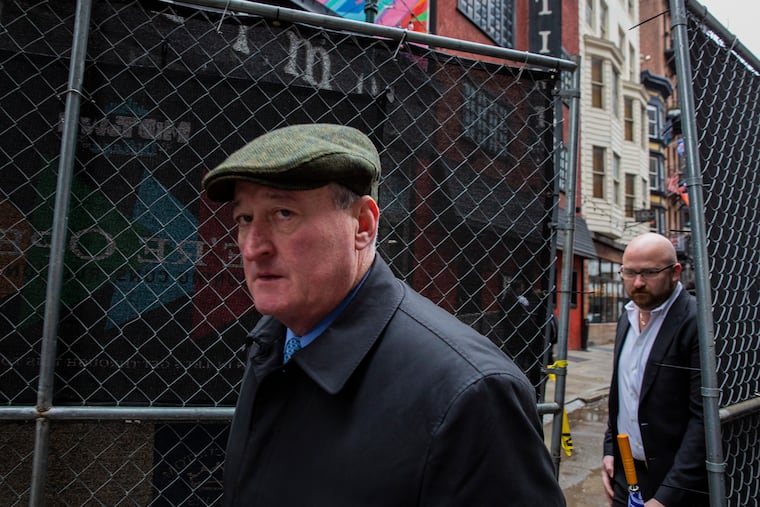Kenney’s punt on street sweeping is positively Dickensian | Mike Newall
Mention street sweeping in South Philadelphia, and a former city councilman will appear at your door like Marley's ghost, wrapped in rags and dragging chains of parking tickets.

Whisper the words "street sweeping" in South Philadelphia, and you can guarantee yourself a visit from the specter of Frank DiCicco.
Come midnight, they say, the former city councilman will appear at your door like Marley's ghost, wrapped in rags and dragging a chain of parking tickets, towing receipts and neighborhood trash. "I wear the chain I forged in life," he'll moan.
He will implore you that you still have a chance to escape his fate — you just must never mention sweeping a single street again, no matter how the trash piles and swells, how high the waters of the clogged storm drains eddy around your feet, or how many neighbors insist that, no, really, they will move their cars for the street-sweeping machines.
I kid. DiCicco is alive and well, of course, and chairing the city zoning board. These days, the longtime city councilman's legacy has been boiled down to that period in the early 2000s when he instituted a street-sweeping program in South Philadelphia. Infamously, he gave up on it after some neighbors complained to his office about having to move their cars — and risking tickets — to make room for the street sweepers.
It wasn't exactly the Boston Tea Party. DiCicco didn't even get voted out of office — or come close to it — the year after complaints surfaced over the street-sweeping program. He did, in fairness, face an existential threat that only a Philly Democrat could experience: He wound up beating his Republican opponent by a mere 31 percentage points, not the 60 that he was accustomed to.
But to hear Mayor Kenney tell it — indeed, according to the collective narrative that has emerged about that time in our trash-strewn city's history — DiCicco was so worried about losing that his near-loss became a cautionary tale about why we can't have nice things like street sweeping in Philly.
Unless the gusts of trash swirling past your windows didn't tell you, we're the only major city in the country without a street-sweeping program. And it doesn't look like one's coming anytime soon.
These sentiments are particularly mystifying when you hear them in the context of the rest of Kenney's platform, which is how they were framed this week in a nearly hour-long interview with the great Marty Moss-Coane on WHYY. The mayor held forth on a number of issues that could define his administration — sanctuary cities, safe injection sites, the soda tax. He's stepped to the plate on these controversial issues in a way few before him have. He even gave his strongest endorsement of safe-injection sites in the radio interview and spoke in detail about the complex challenges that the addiction crisis presents.
Kenney's not afraid to sue the Trump administration over his sanctuary city policies, or convince a reticent City Council to back his soda tax, take on running the school district, or antagonize his South Philly base by suggesting we move the Frank Rizzo statue.
But street sweeping — really, parking — is a bridge too far for Jimmy from Cantrell Street. That's the most Philadelphia thing I ever heard.
"It's really an epidemic I don't understand," he told Moss-Coane, excoriating litterers, recalling the street cleanups of his youth and praising the neighborhood organizers still doing the work. His main hesitancy, he says, is how to get every neighborhood on board.
Kenney staffers say the administration is more focused on short dumping — the businesses unloading tires and construction debris, a problem that largely plagues poor and working-class neighborhoods. That's fair, but against the rest of his record, this hesitancy on street sweeping, from perhaps the country's least risk-averse big-city mayor, is jarring.
Perhaps our South Philadelphia mayor realized you can only push the base so far. Rizzo has them at the breaking point. Parking could wreak hysteria.
I'm a South Philadelphian, though, and considering the Water Department has been tearing up half the neighborhood for years to repair water mains, I think it's sufficiently conditioned us to move the Lincoln once in a while.
WHYY's Ryan Briggs has reported that a citywide bi-weekly street-sweeping program — the most intense proposal — would cost about $18 million up front and $3 million a year. That's a nice chunk of change, but we are a city that just offered Amazon $1 billion in tax credits. We can do this. We can break poor Councilman DiCicco's chains.